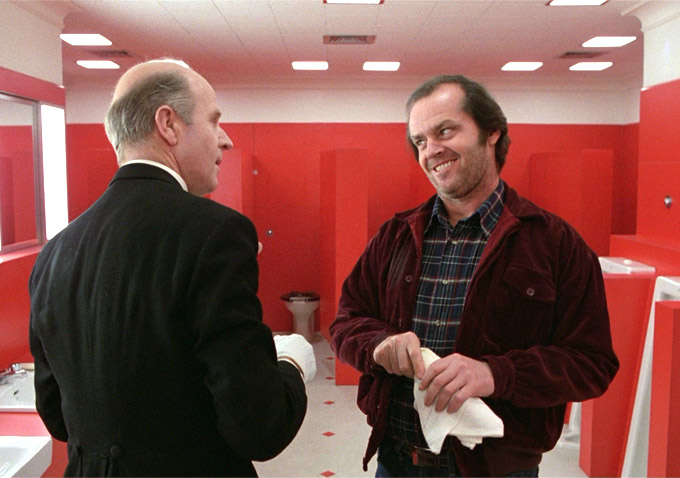
“Perhaps they need a good talking to, if you don’t mind my saying so. Perhaps a bit more. My girls, sir, they didn’t care for the Overlook at first. One of them actually stole a pack of matches and tried to burn it down. But I ‘corrected’ them sir. And when my wife tried to prevent me from doing my duty, I ‘corrected’ her.”
It’s perhaps the most chilling monologue in the history of cinema. Clinical, precise, final. Without a trace of emotion or regret, Delbert Grady has laid bare the inner workings of Man himself. Not a man, or a group of men, but all men. For all time. At heart a killer, yes, but it’s much worse than that. The very trappings of civilization – women, marriage, kids, and family – have doomed him to an eternal rage against order. It’s not just that men recoil in the face of tradition, they seek to blast it away at every opportunity. Saddle him with obligation and responsibility, and he’ll fight all comers. Add the shrill, shrieking cackle of a better half and, well, it’s no longer a matter of if, but when. An unavoidable inevitability. Death, taxes, and family annihilation.
While Jack Torrance is ostensibly our centerpiece, the always off-kilter antihero who realizes his destiny the moment sobriety gives him true clarity, it is Mr. Grady who actually fulfills prophecy. Jack tried mightily, god love him, but while he’s taking his final rest, frozen solid, in the maze of emasculation, Grady hovers above, mission accomplished. He had his marching orders and got to work. While Jack hesitated, Grady grabbed his instrument. One can sense that from failed matchbook to neatly stacked corpses, perhaps a minute of elapsed time. Maybe less. He left not a moment for consideration or countermeasures. Don’t ever let them think you can be outsmarted.
What’s this, a full-throated endorsement of mass murder? Hardly. Simply the recognition that the feminists were right after all: men aren’t fit to live with. They never were, but they have certainly declined even more from the days when, at minimum, they spent so much time earning their keep they rarely had the energy to exert authority at home. Modern man, however, has just the right amount of time. He thinks. He ponders. Compares and contrasts. And yes, he finds it all quite less than he imagined. Chronic dissatisfaction, only now with more debt. Expectations, without a hint of glory. Thanklessness personified. All he can do now is wait for the final snap.
Therefore, The Shining is much more about the looming specter of Grady than anything involving Mr. Torrance. Jack’s the sideshow. The ham-fisted man who telegraphs his punches, allowing wife and son to break free. Grady, all buttoned-up and proper, has the luxury to strike at the moment of his choosing because no one could possibly see it coming. He’s the true Chris Watts of the piece; playing his role with the utmost sincerity until the mask slips just so. Both had the good sense to play the long game; slow, subtle, and sublime. Jack, the poor sap, couldn’t help but leave a trail of crumbs from the opening bell.
Kubrick, by far the most insightful of directors, knew he had to push Jack to the center, not simply because of the novel that inspired the film, but because Mr. Torrance is depressingly typical of the type. Everything, especially the murderous rage, is right at the surface. Nuance and XY chromosomes, the saying goes, rarely share a table. As such, they usually shoot their shot and fade immediately away. The Gradys, however, have the greater capacity. Tiptoeing by largely undetected, they can pick away at the trappings of an increasingly feeble existence until they’re ready to wipe the slate clean. Upending the whole rotten enterprise like so many crave, yet few have the capacity to achieve. If there’s a revolution to put domesticity to bed, it will be Delbert to lead the charge. “My whole life is have to,” to quote another aggrieved sort in an altogether different context. Only Grady says there’s a limit. A line at last, firmly drawn.
Leave a Reply